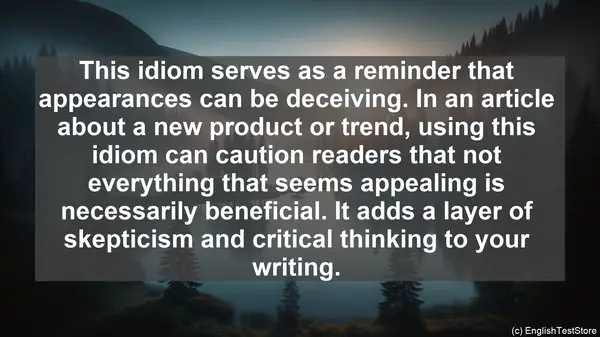Introduction: The Power of Idioms in Writing
Welcome to today’s lesson on English idioms. Idioms are more than just colorful phrases; they have the power to make your writing more engaging and impactful. For newspaper and magazine writers, using idioms can be a game-changer. They not only add depth to your content but also make it more relatable to the readers. So, without further ado, let’s get started!
1. ‘The Ball is in Your Court’
This idiom is often used in situations where a decision or action is now the responsibility of someone else. For example, in an article about a political debate, you can use this idiom to convey that the decision-making power now lies with the audience or the government. It adds a sense of urgency and importance to your writing.

2. ‘A Picture is Worth a Thousand Words’
In the world of journalism, visuals play a crucial role. This idiom emphasizes the impact of visuals, suggesting that a single image can convey a complex message more effectively than a lengthy description. So, the next time you’re writing a travel article, consider including a captivating photograph and let it do the talking.
3. ‘Read Between the Lines’
As a writer, it’s not always about what you explicitly state; sometimes, the real message lies in the subtext. This idiom encourages readers to look beyond the surface and analyze the hidden meaning. It’s perfect for opinion pieces or articles that require critical thinking.
4. ‘The Devil is in the Details’
When it comes to news reporting, accuracy is paramount. This idiom reminds writers to pay attention to the smallest details, as they can often be the most crucial. Whether it’s a financial report or a crime story, ensuring that every piece of information is accurate and comprehensive is essential.
5. ‘In the Limelight’
This idiom refers to being the center of attention. In a celebrity profile or an article about a public figure, using this idiom can highlight their prominence and influence. It’s a great way to add a touch of drama and significance to your writing.
6. ‘A Dime a Dozen’
When something is ‘a dime a dozen,’ it means it’s abundant and not particularly valuable. This idiom is useful when discussing common or easily accessible things. For instance, in an article about online shopping, you can use this idiom to describe the abundance of options available.
7. ‘The Elephant in the Room’
Sometimes, there’s an obvious issue or topic that everyone is aware of, but no one wants to address. This idiom perfectly captures that situation. It’s often used in opinion pieces or articles that tackle sensitive subjects. By acknowledging ‘the elephant in the room,’ you’re bringing attention to the issue that needs to be discussed.

8. ‘Barking up the Wrong Tree’
Imagine a dog barking at a tree, thinking there’s something there, but in reality, the target is elsewhere. This idiom is used to convey the idea of pursuing the wrong course of action or blaming the wrong person. It’s ideal for investigative articles or stories that involve uncovering the truth.
9. ‘All That Glitters is Not Gold’
This idiom serves as a reminder that appearances can be deceiving. In an article about a new product or trend, using this idiom can caution readers that not everything that seems appealing is necessarily beneficial. It adds a layer of skepticism and critical thinking to your writing.
10. ‘To Cut to the Chase’
In a fast-paced world, brevity is often appreciated. This idiom suggests getting straight to the point without unnecessary detours. It’s perfect for news articles or any piece of writing that requires concise and to-the-point information.
Conclusion: Mastering Idioms for Exceptional Writing
English idioms are like hidden gems, waiting to be discovered and used in your writing. By incorporating these idioms into your articles, you’ll not only elevate your language but also captivate your readers. So, make it a habit to explore and learn new idioms regularly. The more idioms you have in your arsenal, the more versatile and impressive your writing will be. Happy writing, everyone!
